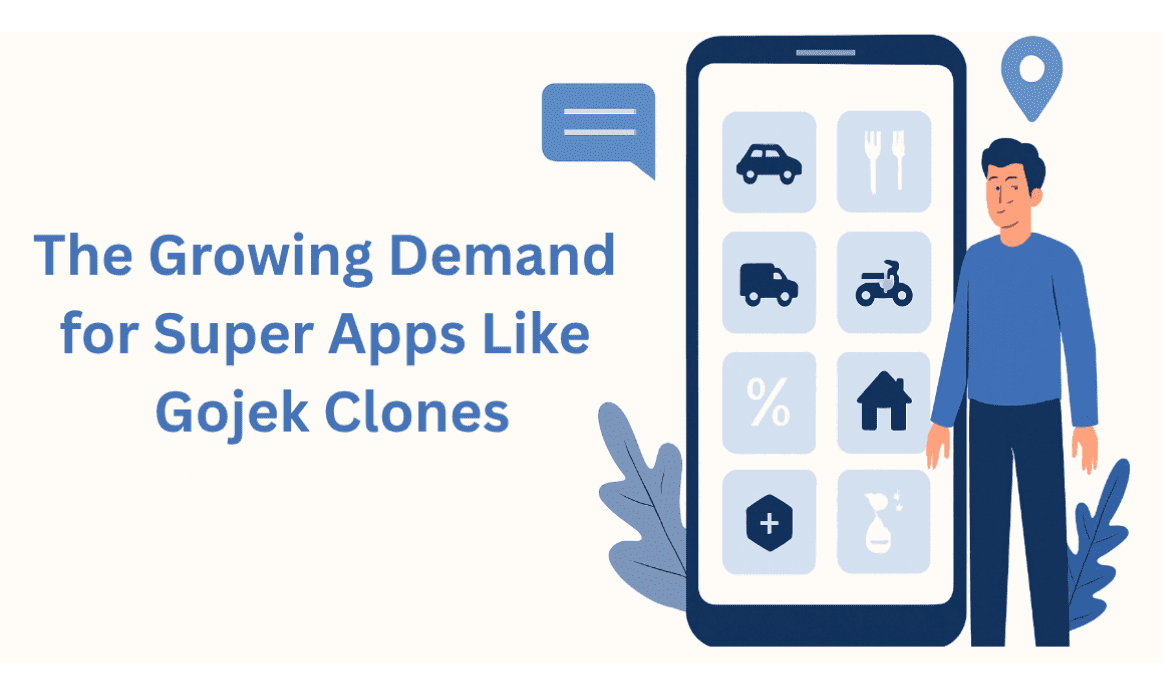In today’s digital-first economy, the way users engage with mobile applications is changing fast. Instead of managing dozens of individual apps for food delivery, taxi bookings, payments, or groceries, users now prefer a one-stop solution known as a super app. These super apps consolidate various services under one platform. A prime example of this model is Gojek, the Indonesia-based platform that combines multiple on-demand services into a single, easy-to-use mobile application.

The demand for similar platforms has surged, and businesses worldwide are now seeking to build their own Gojek Clone to tap into this booming opportunity. But what makes these super apps so powerful and appealing? Let’s explore the growing trend of Gojek-like applications and how they are transforming digital ecosystems globally.
Understanding What Makes a Gojek Clone So Valuable Today
A Gojek Clone refers to a ready-made or custom-built mobile application that replicates the multi-service functionality of Gojek. Typically, these apps offer services such as ride-hailing, food and grocery delivery, courier service, massage bookings, home cleaning, and even digital wallet capabilities.
For businesses and startups, launching a Gojek Clone means stepping into a high-demand market with a versatile product that addresses multiple customer needs. It minimizes user churn by increasing app stickiness through diverse services, ensuring that customers continue using the app frequently.
Market Demand Driving the Success of Multi-Service Platforms
One of the main reasons behind the rising popularity of Gojek Clones is the change in consumer behavior. People now expect more convenience, speed, and simplicity from digital services. With increased smartphone penetration and faster mobile internet, users prefer accessing multiple services from one app rather than juggling multiple logins and interfaces.
From urban dwellers in large cities to users in tier-2 and tier-3 towns, everyone appreciates the utility of having food delivery, taxis, payments, and healthcare consultations available in one platform. As a result, businesses are investing in multi-service platforms to capture this evolving market need.
Key Features Users Expect in a Modern Gojek Clone App
For a Gojek Clone to succeed, it must come equipped with features that make the app robust, user-friendly, and scalable. Some of the most essential features include:
- Multi-service modules: From ride-sharing to on-demand beauty services
- User and provider profiles: Seamless onboarding and profile management
- Real-time tracking: GPS tracking for delivery and ride-hailing
- In-app wallet: Secure and fast digital payments
- Ratings and reviews: Feedback systems to build user trust
- Push notifications: For promotions, order updates, and announcements
- Admin panel: A powerful backend to manage operations smoothly
These core features help build customer loyalty, improve user satisfaction, and create new monetization opportunities.
Business Models That Support Long-Term Growth and Revenue
Super apps, such as a Gojek Clone, can follow different monetization models. Depending on the business objectives, these models may include:
- Commission-based: Charging a percentage from service providers
- Subscription-based: Offering premium features or memberships
- Advertising-based: Displaying third-party ads within the app
- Delivery or booking fees: Adding fixed fees for services like food delivery or ride-hailing
Since the app supports multiple services, it can generate revenue from various streams, making it more stable and profitable in the long term. This model attracts entrepreneurs, traditional service businesses, and even venture capital-backed startups.
Industries Being Transformed by the Rise of Super Apps
While super apps began in Southeast Asia, they are now influencing industries worldwide. Many sectors are being disrupted and enhanced by the multi-service model, including:
- Transport and logistics: Ride-hailing and courier services
- Food and grocery delivery: Instant ordering and home delivery
- Healthcare: Teleconsultations, medicine delivery
- Beauty and wellness: On-demand beauticians, massage therapists
- Financial services: Digital wallets, bill payments, micro-loans
- Home services: Plumbers, electricians, and cleaners at the doorstep
This cross-industry transformation is helping both consumers and service providers thrive in a tech-driven marketplace.
Why Startups and Enterprises Are Investing in Gojek Clone Apps
Startups are constantly seeking innovative ways to solve real-world problems and generate sustainable revenue. Gojek Clone apps present a ready-to-market opportunity with immense scalability. Whether it’s a local entrepreneur looking to build a regional service app or an established business wanting to diversify, the super app model offers a flexible solution.
Moreover, these apps enable businesses to collect large amounts of user data, which can be used to enhance personalization, improve service delivery, and drive more sales through targeted campaigns.
How to Choose the Right Clone App Development Company
Launching a successful Gojek Clone app depends greatly on the development partner. Choosing the right Clone App Development Company is essential for building a feature-rich, secure, and scalable product. Here are some qualities to look for in a development partner:
- Proven track record with multi-service apps
- Strong UI and UX capabilities
- Customizable solutions tailored to the business model
- Robust backend and server architecture
- Ongoing technical support and maintenance
- Compliance with local regulations, such as payments and data privacy
An experienced development team can guide businesses through the entire product lifecycle—from ideation to post-launch scaling.
Future Outlook and Trends for Gojek Clone Apps Globally
As technology advances and user expectations evolve, Gojek Clone apps will continue to adapt and grow. Future trends shaping this space include:
- AI-powered personalization: Offering smarter recommendations and service matching
- Voice assistants and chatbots: Enhancing user engagement and convenience
- Blockchain integration: Adding secure and transparent payments
- Sustainability features: Promoting eco-friendly options for deliveries and transport
- Expansion into rural areas: Reaching untapped markets with simplified app versions
Countries in Asia, Africa, and the Middle East are expected to drive the next wave of super app adoption, given their growing digital infrastructure and young population. Investors are also showing increasing interest in backing such apps due to their diverse revenue potential and long-term user retention.
Conclusion
The rising demand for Gojek Clone apps reflects a major shift in how users consume digital services today. With one platform offering transportation, food, payments, health, and daily services, businesses have an unprecedented opportunity to meet modern consumer expectations.
For entrepreneurs and companies ready to enter this space, investing in a multi-service app offers a scalable, versatile, and future-proof model. By collaborating with the right development team and understanding market needs, launching a Gojek Clone can be a game-changing move in today’s digital economy.








